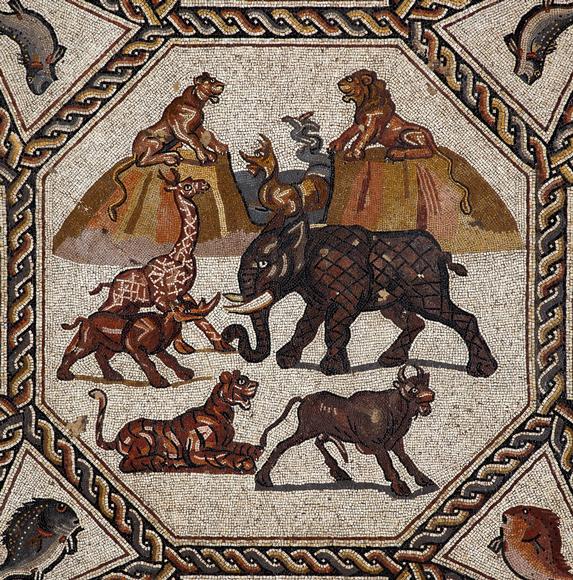In 1996 a series of gorgeous mosaic floors was accidentally uncovered during highway construction in the modern Israeli town of Lod, 15 km (9 miles) from Tel Aviv.
Lod is the ancient town of Lydda, which was destroyed by the Romans in A.D. 66 during the Jewish War and later rebuit.
The mosaic floors measure approximately 17 by 9 meters (50 by 27 feet). Debris of pottery and coins of the third and fourth centuries A.D., suggest they were laid in about A.D. 300.
Mosaics were a costly and time-consuming addition to a property, although they would thereafter require little maintenance and could be expected to last a lifetime. Because of the heavy initial investment however considerable care and attention was paid to create designs that were attractive and appropriate, both to the owner and to the setting.
Despite all the diversity in their manner of execution, design, geographical setting, and dating, Roman mosaics display a number of similarities. So it is very possible that some elements of the Lod Mosaic drew on standard pattern books in use by mosaicists of the Roman Empire. Dolphins are common on Greek mosaics from Delos, marine scenes in Pompeii, and panels with animals and birds within geometric frames in German Cologne of French Arles.
 |
| The central Panel |
The depiction on the Lod Mosaic of solitary or paired groups of creatures, such a large feline hunting a grazing animal, forms part of the common stock of genre subjects.
The central panel with its assortment of African and other animals is absolutely remarkable. The depiction of an elephant, giraffe, and rhinoceros must have been very striking on the coastal plains of ancient Palestine, where such animals were unfamiliar.
Exhibition Schedule in the USA :
The Metropolitan Museum of Art, New York
September 28, 2010-April 3, 2011
Legion of Honor, Fine Arts Museums of San Francisco
April 23, 2011-July 24, 2011
The Field Museum, Chicago
later
No comments:
Post a Comment